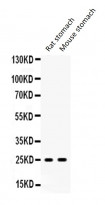ARG59679
anti-PSCA antibody
anti-PSCA antibody for Western blot and Mouse,Rat
Overview
| Product Description | Rabbit Polyclonal antibody recognizes PSCA |
|---|---|
| Tested Reactivity | Ms, Rat |
| Tested Application | WB |
| Host | Rabbit |
| Clonality | Polyclonal |
| Isotype | IgG |
| Target Name | PSCA |
| Antigen Species | Human |
| Immunogen | Recombinant protein corresponding to L21-S95 of Human PSCA. |
| Conjugation | Un-conjugated |
| Alternate Names | PRO232 |
Application Instructions
| Application Suggestion |
|
||||
|---|---|---|---|---|---|
| Application Note | * The dilutions indicate recommended starting dilutions and the optimal dilutions or concentrations should be determined by the scientist. |
Properties
| Form | Liquid |
|---|---|
| Purification | Affinity purification with immunogen. |
| Buffer | 0.9% NaCl, 0.2% Na2HPO4, 0.05% Sodium azide and 5% BSA. |
| Preservative | 0.05% Sodium azide |
| Stabilizer | 5% BSA |
| Concentration | 0.5 mg/ml |
| Storage Instruction | For continuous use, store undiluted antibody at 2-8°C for up to a week. For long-term storage, aliquot and store at -20°C or below. Storage in frost free freezers is not recommended. Avoid repeated freeze/thaw cycles. Suggest spin the vial prior to opening. The antibody solution should be gently mixed before use. |
| Note | For laboratory research only, not for drug, diagnostic or other use. |
Bioinformation
| Gene Symbol | PSCA |
|---|---|
| Gene Full Name | prostate stem cell antigen |
| Background | This gene encodes a glycosylphosphatidylinositol-anchored cell membrane glycoprotein. In addition to being highly expressed in the prostate it is also expressed in the bladder, placenta, colon, kidney, and stomach. This gene is up-regulated in a large proportion of prostate cancers and is also detected in cancers of the bladder and pancreas. This gene includes a polymorphism that results in an upstream start codon in some individuals; this polymorphism is thought to be associated with a risk for certain gastric and bladder cancers. Alternative splicing results in multiple transcript variants. [provided by RefSeq, Feb 2010] |
| Function | May be involved in the regulation of cell proliferation. Has a cell-proliferation inhibition activity in vitro. May act as a modulator of nicotinic acetylcholine receptors (nAChRs) activity. In vitro inhibits nicotine-induced signaling probably implicating alpha-3:beta-2- or alpha-7-containing nAChRs. [UniProt] |
| Cellular Localization | Cell membrane; Lipid-anchor, GPI-anchor. [UniProt] |
| Calculated MW | 12 kDa |
Images (1) Click the Picture to Zoom In






